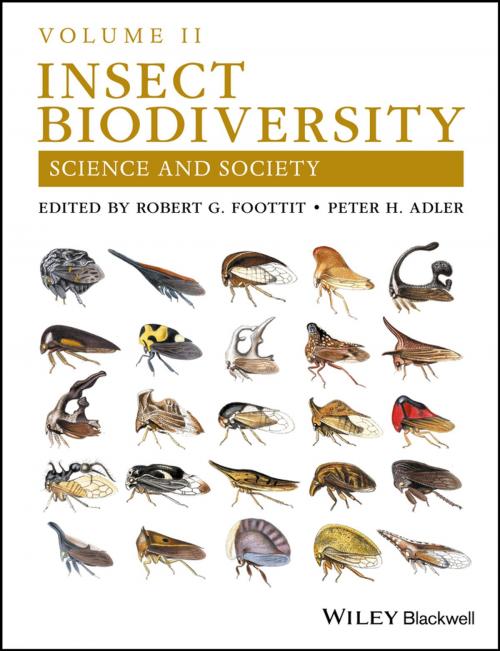Insect Biodiversity
Science and Society
Nonfiction, Science & Nature, Science, Biological Sciences, Entomology| Author: | ISBN: | 9781118945599 | |
| Publisher: | Wiley | Publication: | April 11, 2018 |
| Imprint: | Wiley-Blackwell | Language: | English |
| Author: | |
| ISBN: | 9781118945599 |
| Publisher: | Wiley |
| Publication: | April 11, 2018 |
| Imprint: | Wiley-Blackwell |
| Language: | English |
Volume Two of the new guide to the study of biodiversity in insects
Volume Two of Insect Biodiversity: Science and Society presents an entirely new, companion volume of a comprehensive resource for the most current research on the influence insects have on humankind and on our endangered environment. With contributions from leading researchers and scholars on the topic, the text explores relevant topics including biodiversity in different habitats and regions, taxonomic groups, and perspectives.
Volume Two offers coverage of insect biodiversity in regional settings, such as the Arctic and Asia, and in particular habitats including crops, caves, and islands. The authors also include information on historical, cultural, technical, and climatic perspectives of insect biodiversity.
This book explores the wide variety of insect species and their evolutionary relationships. Case studies offer assessments on how insect biodiversity can help meet the needs of a rapidly expanding human population, and examine the consequences that an increased loss of insect species will have on the world. This important text:
- Offers the most up-to-date information on the important topic of insect biodiversity
- Explores vital topics such as the impact on insect biodiversity through habitat loss and degradation and climate change
- With its companion Volume I, presents current information on the biodiversity of all insect orders
- Contains reviews of insect biodiversity in culture and art, in the fossil record, and in agricultural systems
- Includes scientific approaches and methods for the study of insect biodiversity
The book offers scientists, academics, professionals, and students a guide for a better understanding of the biology and ecology of insects, highlighting the need to sustainably manage ecosystems in an ever-changing global environment.
Volume Two of the new guide to the study of biodiversity in insects
Volume Two of Insect Biodiversity: Science and Society presents an entirely new, companion volume of a comprehensive resource for the most current research on the influence insects have on humankind and on our endangered environment. With contributions from leading researchers and scholars on the topic, the text explores relevant topics including biodiversity in different habitats and regions, taxonomic groups, and perspectives.
Volume Two offers coverage of insect biodiversity in regional settings, such as the Arctic and Asia, and in particular habitats including crops, caves, and islands. The authors also include information on historical, cultural, technical, and climatic perspectives of insect biodiversity.
This book explores the wide variety of insect species and their evolutionary relationships. Case studies offer assessments on how insect biodiversity can help meet the needs of a rapidly expanding human population, and examine the consequences that an increased loss of insect species will have on the world. This important text:
- Offers the most up-to-date information on the important topic of insect biodiversity
- Explores vital topics such as the impact on insect biodiversity through habitat loss and degradation and climate change
- With its companion Volume I, presents current information on the biodiversity of all insect orders
- Contains reviews of insect biodiversity in culture and art, in the fossil record, and in agricultural systems
- Includes scientific approaches and methods for the study of insect biodiversity
The book offers scientists, academics, professionals, and students a guide for a better understanding of the biology and ecology of insects, highlighting the need to sustainably manage ecosystems in an ever-changing global environment.















